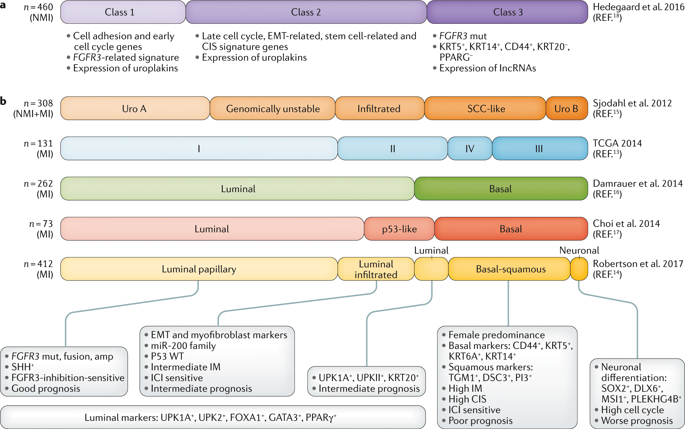当前位置:
X-MOL 学术
›
Nat. Rev. Urol.
›
论文详情
Our official English website, www.x-mol.net, welcomes your
feedback! (Note: you will need to create a separate account there.)
Competitive glucose metabolism as a target to boost bladder cancer immunotherapy.
Nature Reviews Urology ( IF 12.1 ) Pub Date : 2020-01-17 , DOI: 10.1038/s41585-019-0263-6 Julieta Afonso 1, 2 , Lúcio L Santos 3, 4, 5, 6 , Adhemar Longatto-Filho 1, 2, 7, 8 , Fátima Baltazar 1, 2
Nature Reviews Urology ( IF 12.1 ) Pub Date : 2020-01-17 , DOI: 10.1038/s41585-019-0263-6 Julieta Afonso 1, 2 , Lúcio L Santos 3, 4, 5, 6 , Adhemar Longatto-Filho 1, 2, 7, 8 , Fátima Baltazar 1, 2
Affiliation

|
Bladder cancer - the tenth most frequent cancer worldwide - has a heterogeneous natural history and clinical behaviour. The predominant histological subtype, urothelial bladder carcinoma, is characterized by high recurrence rates, progression and both primary and acquired resistance to platinum-based therapy, which impose a considerable economic burden on health-care systems and have substantial effects on the quality of life and the overall outcomes of patients with bladder cancer. The incidence of urothelial tumours is increasing owing to population growth and ageing, so novel therapeutic options are vital. Based on work by The Cancer Genome Atlas project, which has identified targetable vulnerabilities in bladder cancer, immune checkpoint inhibitors (ICIs) have arisen as an effective alternative for managing advanced disease. However, although ICIs have shown durable responses in a subset of patients with bladder cancer, the overall response rate is only ~15-25%, which increases the demand for biomarkers of response and therapeutic strategies that can overcome resistance to ICIs. In ICI non-responders, cancer cells use effective mechanisms to evade immune cell antitumour activity; the overlapping Warburg effect machinery of cancer and immune cells is a putative determinant of the immunosuppressive phenotype in bladder cancer. This energetic interplay between tumour and immune cells leads to metabolic competition in the tumour ecosystem, limiting nutrient availability and leading to microenvironmental acidosis, which hinders immune cell function. Thus, molecular hallmarks of cancer cell metabolism are potential therapeutic targets, not only to eliminate malignant cells but also to boost the efficacy of immunotherapy. In this sense, integrating the targeting of tumour metabolism into immunotherapy design seems a rational approach to improve the therapeutic efficacy of ICIs.
中文翻译:

竞争性葡萄糖代谢作为增强膀胱癌免疫疗法的目标。
膀胱癌-全球第十大最常见的癌症-具有异质的自然史和临床行为。尿路上皮癌是主要的组织学亚型,其特点是复发率高,进展以及对铂类疗法的原发性和获得性耐药,这给医疗保健系统带来了可观的经济负担,并对生活质量和生活质量产生了重大影响。膀胱癌患者的整体预后。由于人口增长和老龄化,尿路上皮肿瘤的发病率正在增加,因此新颖的治疗选择至关重要。根据癌症基因组图谱(The Cancer Genome Atlas)项目的工作,该项目已经确定了膀胱癌的目标脆弱性,因此免疫检查点抑制剂(ICI)已经成为控制晚期疾病的有效替代方法。然而,尽管ICI在部分膀胱癌患者中显示出持久的反应,但总缓解率仅为约15-25%,这增加了对反应生物标志物和可克服ICI耐药性的治疗策略的需求。在ICI无反应者中,癌细胞利用有效机制逃避免疫细胞的抗肿瘤活性。癌症和免疫细胞重叠的Warburg效应机制是膀胱癌免疫抑制表型的推定决定因素。肿瘤与免疫细胞之间的这种有力相互作用导致肿瘤生态系统中的新陈代谢竞争,限制了营养物质的利用,并导致微环境酸中毒,从而阻碍了免疫细胞的功能。因此,癌细胞新陈代谢的分子特征是潜在的治疗靶点,不仅可以消除恶性细胞,而且可以提高免疫疗法的功效。从这个意义上讲,将靶向肿瘤代谢的分子整合到免疫治疗设计中似乎是提高ICI治疗效果的合理方法。
更新日期:2020-01-17
中文翻译:

竞争性葡萄糖代谢作为增强膀胱癌免疫疗法的目标。
膀胱癌-全球第十大最常见的癌症-具有异质的自然史和临床行为。尿路上皮癌是主要的组织学亚型,其特点是复发率高,进展以及对铂类疗法的原发性和获得性耐药,这给医疗保健系统带来了可观的经济负担,并对生活质量和生活质量产生了重大影响。膀胱癌患者的整体预后。由于人口增长和老龄化,尿路上皮肿瘤的发病率正在增加,因此新颖的治疗选择至关重要。根据癌症基因组图谱(The Cancer Genome Atlas)项目的工作,该项目已经确定了膀胱癌的目标脆弱性,因此免疫检查点抑制剂(ICI)已经成为控制晚期疾病的有效替代方法。然而,尽管ICI在部分膀胱癌患者中显示出持久的反应,但总缓解率仅为约15-25%,这增加了对反应生物标志物和可克服ICI耐药性的治疗策略的需求。在ICI无反应者中,癌细胞利用有效机制逃避免疫细胞的抗肿瘤活性。癌症和免疫细胞重叠的Warburg效应机制是膀胱癌免疫抑制表型的推定决定因素。肿瘤与免疫细胞之间的这种有力相互作用导致肿瘤生态系统中的新陈代谢竞争,限制了营养物质的利用,并导致微环境酸中毒,从而阻碍了免疫细胞的功能。因此,癌细胞新陈代谢的分子特征是潜在的治疗靶点,不仅可以消除恶性细胞,而且可以提高免疫疗法的功效。从这个意义上讲,将靶向肿瘤代谢的分子整合到免疫治疗设计中似乎是提高ICI治疗效果的合理方法。











































 京公网安备 11010802027423号
京公网安备 11010802027423号